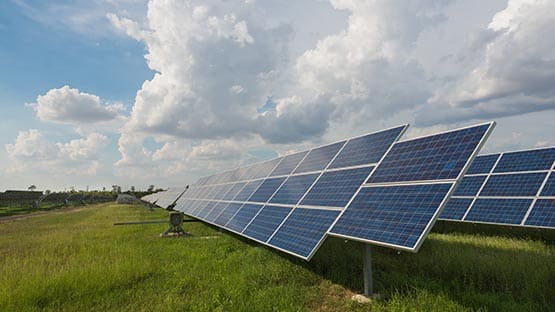
The historic $27 billion Greenhouse Gas Reduction Fund has made possible the $156 million through the Solar for All grant competition awarded to Virginians who are low income or live in disadvantaged communities.
The funding will develop long-lasting solar programs that enable low-income and disadvantaged communities to deploy and benefit from distributed residential solar.
The Greenhouse Gas Reduction Fund was created under President Biden’s Inflation Reduction Act to lower energy costs for families, create good-quality jobs in communities that have been left behind, advance environmental justice, and tackle the climate crisis.
“Today we’re delivering on President Biden’s promise that no community is left behind by investing $7 billion in solar energy projects for over 900,000 households in low-income and disadvantaged communities,” Environmental Protection Agency (EPA) Administrator Michael S. Regan said. “The selectees will advance solar energy initiatives across the country, creating hundreds of thousands of good-paying jobs, saving $8 billion in energy costs for families, delivering cleaner air, and combating climate change.”
The SFA: Virginia Energy Program (SAVE) will seek to enable energy savings and increase resilience by expanding access to solar and solar plus storage funding for low-income and disadvantaged communities. SFA funds will be used to transform the low-income solar market in Virginia by leveraging additional private capital and supporting solar business formation and expansion. SAVE will address existing market barriers to solar development by reducing upfront costs, enabling broader access to leasing and power purchase agreements, increasing access to financing for low-income homeowners, and removing barriers to interconnection.
“The health and economic benefits of renewable energy should be accessible to every community,” EPA Mid-Atlantic Regional Administrator Adam Ortiz said. “With today’s announcement, the Biden-Harris administration is investing almost $700,000,000 across the mid-Atlantic, enabling low-income and disadvantaged communities to make the transition to clean and affordable energy, while also reducing our impact on the world’s climate.”
Virginia Department of Energy is among 49 state-level awards EPA announced yesterday totaling approximately $5.5 billion, along with six awards to serve Tribes totaling more than $500 million, and five multistate awards totaling approximately $1 billion.
A complete list of the selected applicants can be found on EPA’s Greenhouse Gas Reduction Fund Solar for All website.
The Solar for All program also advances President Biden’s Justice40 Initiative, which set the goal for 40 percent of the overall benefits of certain federal climate, clean energy, affordable and sustainable housing, and other investments flow to disadvantaged communities that are marginalized by underinvestment and overburdened by pollution. All of the funds awarded through the Solar for All program will be invested in low-income and disadvantaged communities. The program will also help meet the President’s goal of achieving a carbon pollution-free power sector by 2035 and net-zero emissions economy by no later than 2050.
EPA estimates that the 60 Solar for All recipients will enable over 900,000 households in low-income and disadvantaged communities to deploy and benefit from distributed solar energy. The $7 billion investment will generate more than $350 million in annual savings on electric bills for overburdened households. The program will reduce 30 million metric tons of carbon dioxide equivalent emissions cumulatively, from over four gigawatts of solar energy capacity unlocked for low-income communities over five years. Solar and distributed energy resources help improve electric grid reliability and climate resilience, which is especially important in disadvantaged communities that have long been underserved.
Solar for All will deliver on the Biden-Harris Administration’s commitment to creating high-quality jobs with the free and fair choice to join a union for workers across the United States. This $7 billion investment in clean energy will generate an estimated 200,000 jobs across the country. All selected applicants intend to invest in local, clean energy workforce development programs to expand equitable pathways into family-sustaining jobs for the communities they are designed to serve. At least 35 percent of selected applicants have already engaged local or national unions, demonstrating how these programs will contribute to the foundation of a clean energy economy built on strong labor standards and inclusive economic opportunity for all American communities.
The Solar for All program also advances President Biden’s Justice40 Initiative, which set the goal that 40 percent of the overall benefits of certain federal climate, clean energy, affordable and sustainable housing, and other investments flow to disadvantaged communities that are marginalized by underinvestment and overburdened by pollution. All of the funds awarded through the Solar for All program will be invested in low-income and disadvantaged communities. The program will also help meet the President’s goal of achieving a carbon pollution-free power sector by 2035 and net-zero emissions economy by no later than 2050.
The 60 selected applicants have committed to delivering on the three objectives of the Greenhouse Gas Reduction Fund: reducing climate and air pollution; delivering benefits to low-income and disadvantaged communities; and mobilizing financing to spur additional deployment of affordable solar energy. Solar for All selected applicants are expanding existing low-income solar programs and launching new programs. In at least 25 states and territories nationwide, Solar for All is launching new programs where there has never been a substantial low-income solar program before. In these geographies, Solar for All selected applicants will open new markets for distributed solar by funding new programs that provide grants and low-cost financing for low-income, residential solar.










